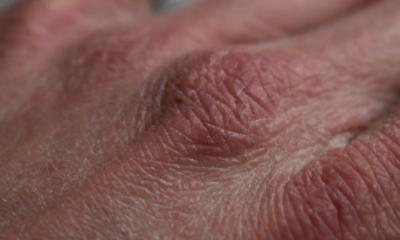
- Published on 01-May-2022
- 0 Likes
- 0 Comments
- 393 Times Read
The number of people with skin problems has been increasing in recent years. Moreover, there is a notable increase in people who admit to having sensitive and dry skin. There is a bit of difficulty finding a scientific definition for "sensitive skin" as there are many differing, measurable criteria for its definition. However, normal skin can develop a higher sensitivity when exposed to the following stimuli : sunburn; heavy skin-peeling; occupationally-related above normal exposure to water, alkalis and solvents, internal illnesses such as the increased skin dryness seen in age-related diabetes or the general itching that can accompany kidney diseases and psychological factors like stress.
Dry skin is especially common in children under 10 and older people over 60. Between 10 to 50 years of age, the number of women with dry skin is markedly more than in the case of men. The common characteristic of dry skin are light scaling, tightness and sometimes, itching. Basically, there are two types of dry skin - normal dry skin and extreme dry skin. In both types, the cause is essentially a deficit of natural moisturizing factors. A rarer form is atopic dry skin, in which a disturbed fatty acid metabolism of the skin contribute a major role.
Cleaning and Care of Dry Skin
To restore your dry skin to its normal physiological condition, pay extra close attention to your cleansing and skincare routine. In choosing cleansing products for dry skin, here are few pointers to bear in mind :
- Make sure the cleansing preparations are made up of mild cleansing complexes with re-oiling agents that remove fat-soluble (lipophilic) dirt particles.
- The cleansing substances' supply of lipids should promote and ensure an intensive replenishing of skin oils.
- The fatty-acid constituents of the re-oiling agents should also be similar to the skin's natural oils to blend especially well into the horny skin layer, thereby restoring the protective lipid film during washing and helping to maintain your skin's natural pH balance.
Choosing Skin Care Products
It is important to choose skincare products that contain various active ingredients that reinforce the skin's own protective functions. Here are pointers and ingredients to watch our for :
- For example, skincare products that contain the antioxidant Vitamin E are effective in preventing, or at the very least, delaying skin aging. Vitamin E is a fat soluble vitamin that hinders the oxidation of poly-unsaturated fatty acids, thus helping to firm up the cell membrane and delay cell-aging.
- Choose skincare products that protect the skin from damaging environmental influences such as dryness and colds. Where the skin condition has been disturbed, choose skincare products that contain moisturizing agents and substance that will help normalize the skin, heal it and prevent diseases. For example, as a Vitamin B derivative, Dexpanthenol is said to enhance wound healing and cell-formation. Vitamin C in citric acid form is also a popular skincare substance that is used mainly because it helps in wound-healing and cell regenerations.
- Those with especially sensitive-skin or skin affected by neurodermatitis should choose skincare products suitable for deodorant-intolerant skin.
- The skincare products' efficacy should have been objectively and comprehensively evaluated and the confirmed in clinical studies.
Healthy skin, for the most part, results from a balance of moisture and oils and the physiological pH-value (acid mantle of the skin around 4.5 - 5.75) of the skin's surface. Always remember to choose cleansing and skincare products that are quickly absorbed into the skin and activate the various regenerating metabolic processes of the skin cells.
Causes of Dry Skin :
- Biological skin ageing
- Chemical and medicinal influences
- Climate and environment
- Genetic disposition
- Hormonal influences
- Illness
- Light-induced skin ageing
- Nutrition



0 Comments